Northern Human Rights Group — a center for expert support for internally displaced persons in Sumy Oblast
Publication date: September 3, 2025
Author: Yulia Bilyk, Communications Manager, Legal Development Network
For over a decade, the Northern Human Rights Group, which joined the Legal Development Network in 2017, has been protecting the rights and providing comprehensive support to internally displaced persons in the Sumy Oblast. During the years of full-scale war, the organization has expanded its expertise, becoming a space that brings together partners — players from the public and charitable sectors, representatives of government and local self-government bodies — with vulnerable categories of citizens who need special attention from them. Thanks to flexible funding from GlobalGiving, the NGO consistently fulfills its mission despite the security and economic challenges of wartime.
The Northern Human Rights Group’s office is located in the center of Sumy, which is synonymous with the epicenter of danger. Russian missiles have attacked the nearby Sumy Regional State Administration building several times. Therefore, the organization only receives citizens in person when there is no threat of shelling and exclusively by appointment, as well as at partners’ offices and remotely.
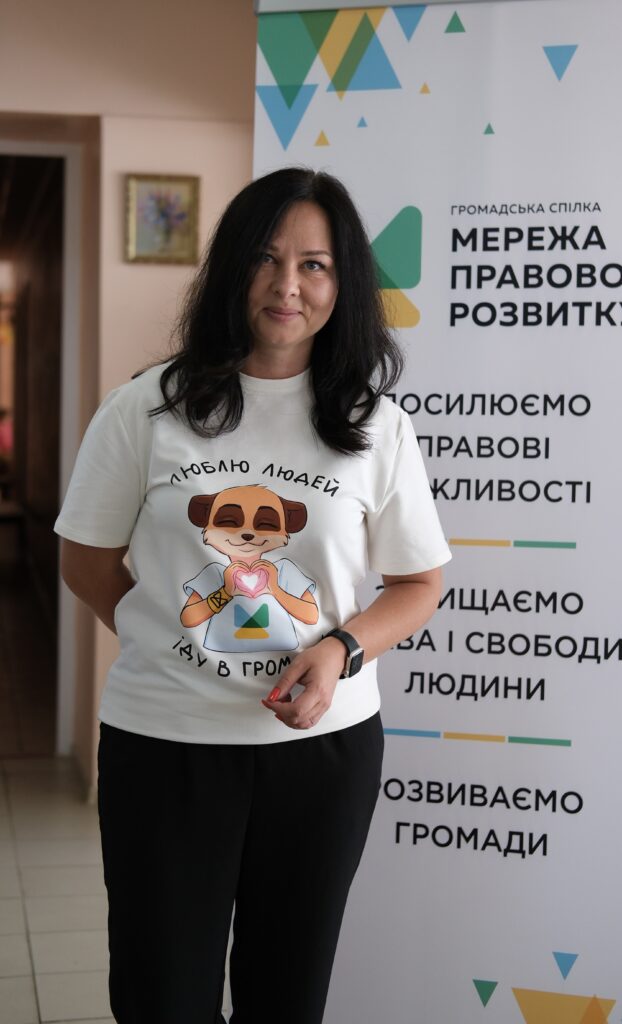
“We are trying to adapt to the security conditions and the situation, which can change from day to day. We did not leave in 2022 and are not leaving now; most of our employees are here. We are trying to further develop the organization and help people,” says Natalia Yesina, executive director of the Northern Human Rights Group.
In addition to the executive director, the organization’s team includes three lawyers and two attorneys who advise clients on legal issues, as well as an expert who conducts training activities for target groups. Providing expert support is a relatively new area of activity for the Northern Human Rights Group.
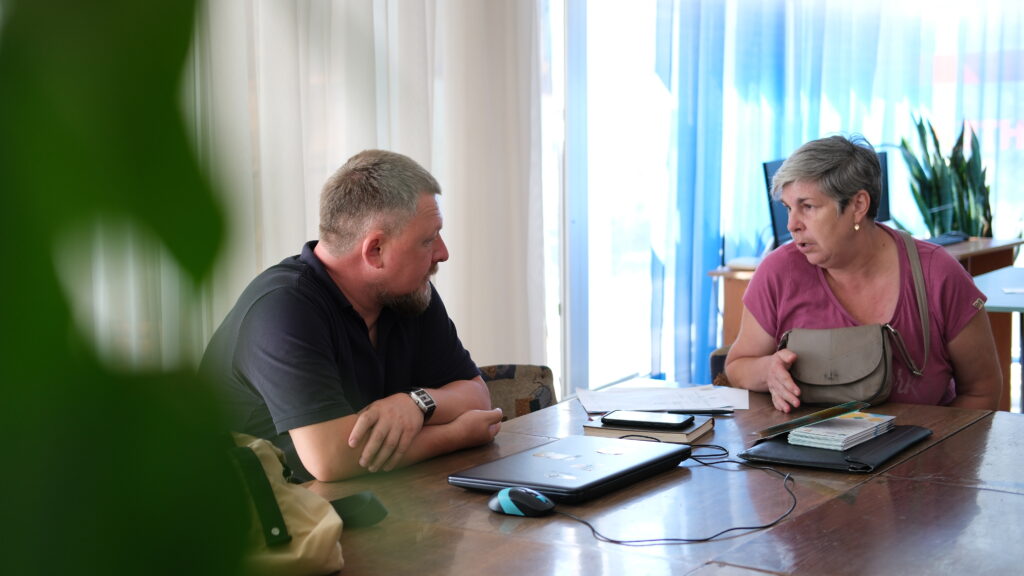
“Recently, local and national organizations have begun to contact me and our colleague Marina Yezhkun about conducting training sessions in the Sumy region. We conduct many trainings on gender-inclusive recovery, mediation, fundraising, starting your own business, and advocacy. Recently, we conducted training on how to write a project application to obtain grant funding to solve problems in the community,” says Natalia Yesina.
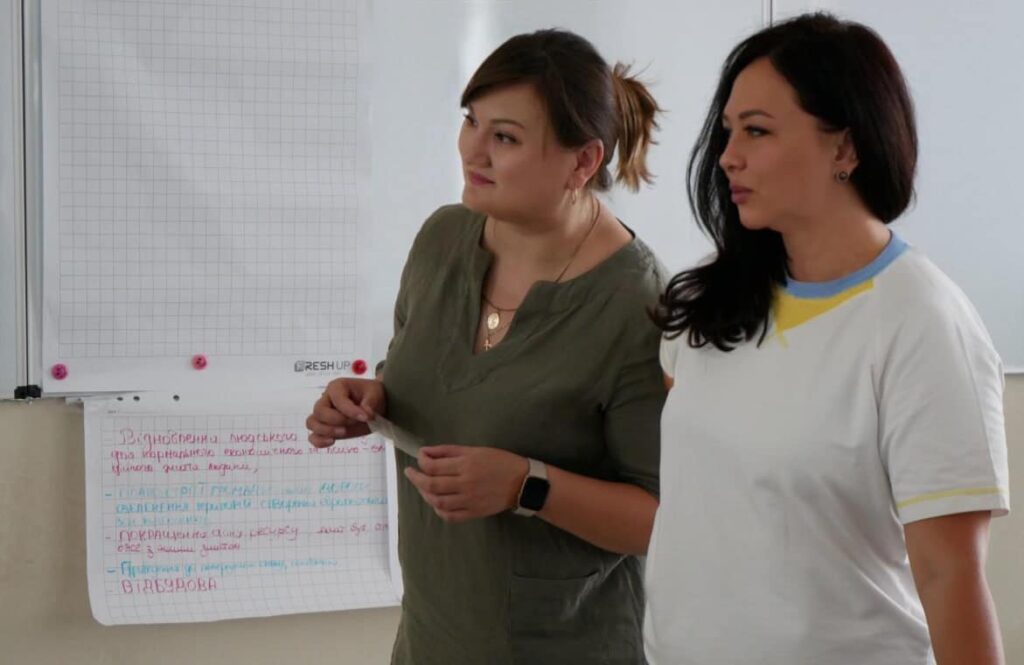
Receiving funding from GlobalGiving coincided with a series of requests from displaced communities to hold informational and educational events.
“We were invited by displaced communities that gather at the local library, the social space at the Beregynya municipal institution, and the city council’s social protection department. We are always happy to respond to invitations and share useful information with people. But thanks to the support of GlobalGiving, we were able to organize ourselves better and invest more of our professional resources and time in preparation and events,” says Natalia Yesina.
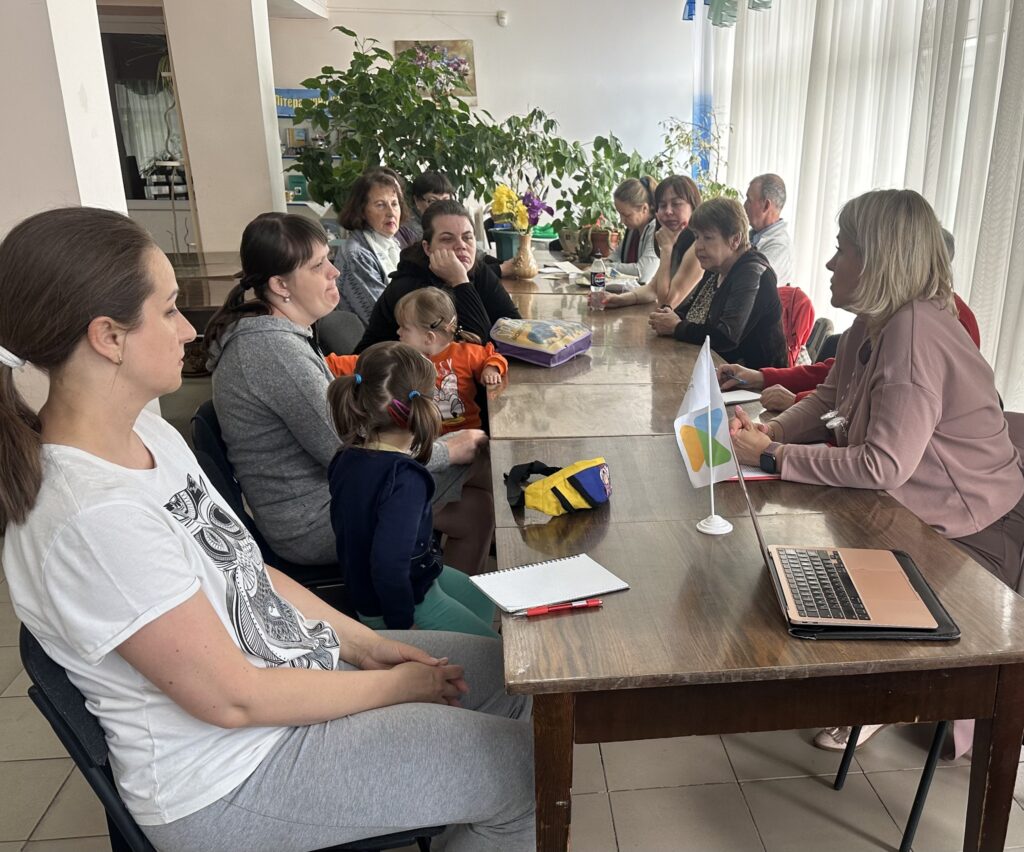
Among the topics that the Northern Human Rights Group has to return to again and again in its legal awareness activities, as they unfortunately remain relevant today, are:
- recording destroyed/damaged property;
- obtaining compensation for destroyed/damaged property;
- how to arrange travel abroad (what to take with you, how to arrange travel, what happens to your IDP status if you move, whether this status is taken into account abroad, what statuses exist abroad, how refugee status differs from migrant status);
- the importance of timely registration of civil status acts (marriage, divorce, birth of children, death).
“At every meeting we hold, I devote part of the time to the topic of registering civil status acts. And at every meeting, there are always one or two people who start nodding their heads: for example, I haven’t lived with my husband for 10 years, but we are still married, or we registered our children under one husband’s name, and then started living with another. As a result, there is complete confusion about status and paternity, and when it comes to determining payments, all these factors come to the surface and lawyers have to sort everything out,” explains Natalia Yesina.
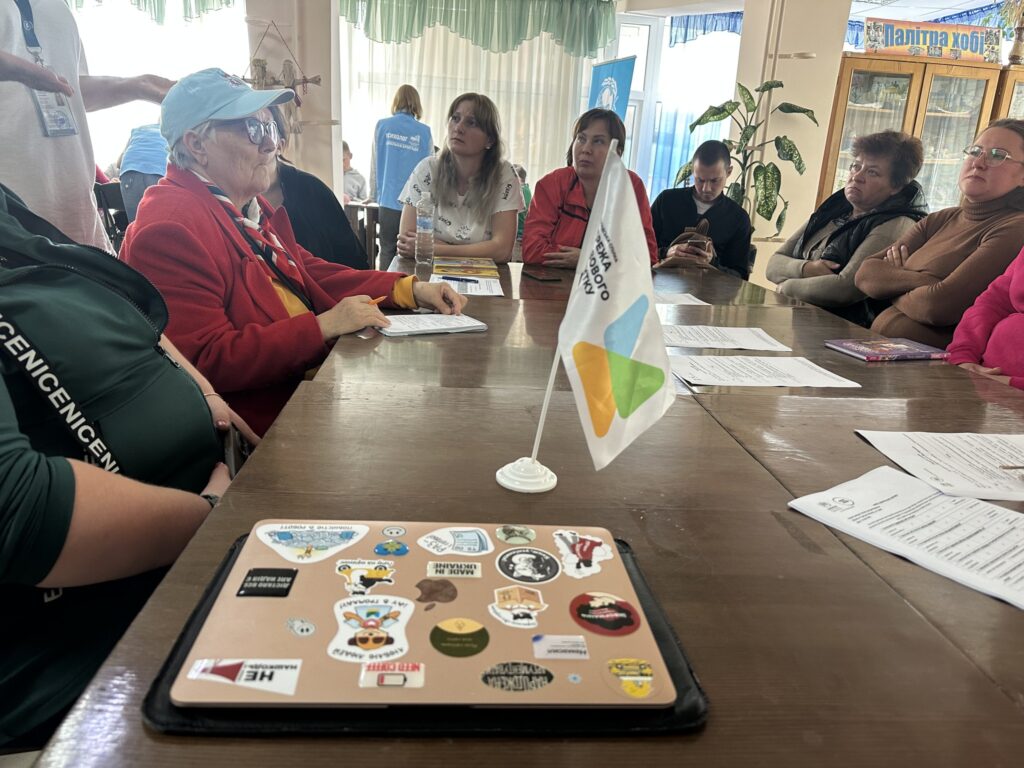
Support for displaced persons
In the Sumy region, the Northern Human Rights Group was one of the first public initiatives that began to systematically support internally displaced persons back in 2015. Today, this area of activity remains key.
“When we started in 2015 and worked with the Pension Fund and the Social Protection Department, we did not always encounter a willingness to cooperate and faced stereotypes about displaced persons. Now, when there are more than 100,000 internally displaced persons in the region (according to the Sumy Regional State Administration, as of August 18, 2025 — 100,198 persons — ed.), we already receive support from regional authorities, local governments, and communities. I have received feedback several times: now I understand what you were talking about then,” shares Natalia Yesina.
The executive director of the NGO explains that the issue of internal displacement has become more relevant to many people, including those in power. Firstly, because there are no people left in the Sumy region who have not been affected by it. Given the constant shelling and the situation on the front line, the thought that tomorrow you may be forced to pack your bags and leave your home is on everyone’s mind, from community residents to government officials. Secondly, most IDPs in the Sumy region are people who have moved within the region to safer settlements. This has led to an understanding of the deep-rooted problems faced by IDPs: unstable psychological state, lack of property, and inability to meet their basic needs independently.
“This is not something to be happy about. But it is good that this understanding has finally emerged,” emphasizes Natalia Yesina, who knows about the problems of IDPs firsthand — in 2014, she and her family moved to Sumy from the occupied city of Schyastya in the Luhansk Oblast. For some time, Natalia was an advisor to the head of the Sumy Regional State Administration on internally displaced persons, and since 2023 she has headed the IDP Council in the Sumy community.
Sumy Partnership
Since 2022, the Northern Human Rights Group, recognizing the scale of assistance required by the people and the number of proactive civil society leaders in the Sumy region, has undertaken to streamline processes. In order to bring together all service providers and create a common understanding of who does what, a Telegram chat called “Sumy Partnership” was created. The chat is administered by Natalia Yesina, and its 159 members are committed to correctly redirecting requests. This makes it possible to quickly address people’s urgent needs: hygiene products, food aid, evacuation from dangerous areas, finding housing, etc.
“Representatives of various organizations are present in the chat. If, for one reason or another, they cannot satisfy a request on their own, they receive support or forward the issue to their partners. We also exchange ideas and coordinate joint actions. For example, there is a problem with the acceptance of documents at a certain institution. We agree in the chat to meet at the Administrative Services Center or the Pension Fund, get together, and decide how to proceed. This is much faster and more effective than entering into direct conflict, resolving issues in court, etc.,” explains Natalia Yesina.
Building bridges of understanding
Now, government officials turn to Natalia and her colleagues as experts in communicating with displaced persons. The trust in the organization, built up over years of experience, helps build bridges of understanding between the government and citizens.
“For example, the responsibility for assigning payments to internally displaced persons was transferred from social protection departments to the Pension Fund of Ukraine. People have many questions about whether they need to update their documents. In response, we create a situation of direct contact — a joint event attended by employees of both the Pension Fund and social protection, who directly answer people’s questions. People receive comprehensive information, and officials see what concerns people have and what the mood is like on the other side of their work,” notes Natalia Yesina.
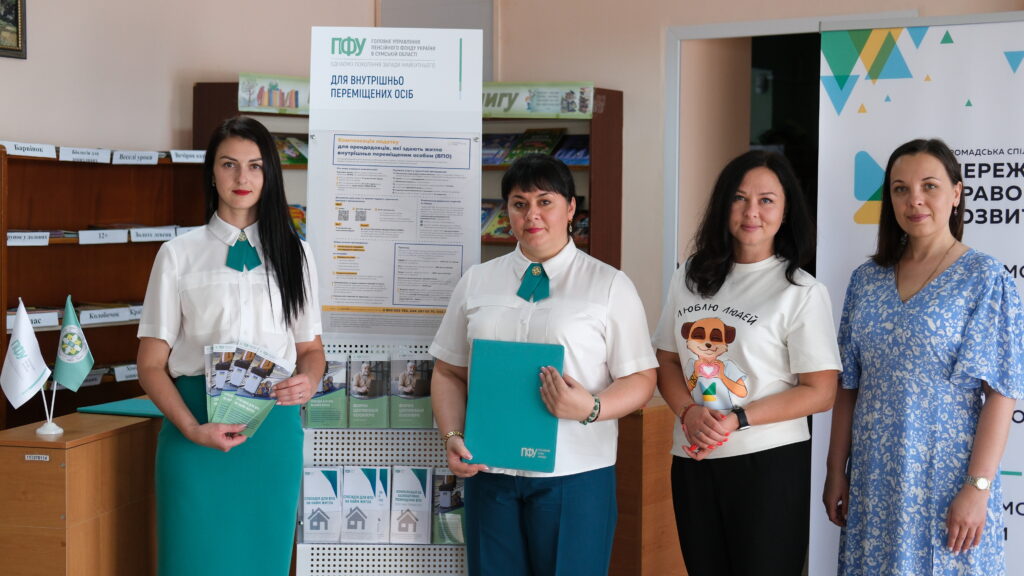
According to the executive director of the Northern Human Rights Group, today the authorities and communities need to think faster and help IDPs adapt to their new lives. Currently, displaced persons are still trying to visit their homes, plant gardens, and keep livestock, which creates obstacles during evacuation. However, given the proximity to the border, the intensity of hostilities, and the contamination of the territory with ammunition, it is important to understand that people have to leave and are unlikely to be able to return home in the near future.
Mentoring for IDP initiatives
Internally displaced persons are not special people; their community reflects the same cross-section as society in general: there are rich and poor people, educated and uneducated people, those who are motivated to start their own business and those who lack the necessary motivation. For those who are ready to settle and develop in the Sumy community, quality training and mentoring support are essential, Natalia Yesina constantly emphasizes. Several organizations in the community have decided to support the implementation of initiatives by internally displaced persons.
“I was able to convey to displaced persons and community activists the idea of the need for mentoring support. When you have someone by your side — from the moment you start writing your application to your first tax report — who says, ‘I’m with you, I know you’re afraid, I’ll help you register as a sole proprietor and resolve issues at the Administrative Services Centre,’ then you’ll find the inner strength to take action. This resource — doing business in an unstable region — must be powerful. Not all local residents dare to do this, let alone IDPs who have been traumatized by displacement,” emphasizes Natalia Yesina.
At the same time, Natalia recalls a case that demonstrates the surprisingly strong motivation for development on the part of displaced women in particular. On the eve of a training session organized jointly with the League of Modern Women, the enemy attacked residential buildings near the venue. It was a terrible tragedy in which people were injured and even killed. However, more than 30 women who had registered for the training decided not to cancel the event and came to learn.

“It was inconceivable to me that so many women were ready to start their own businesses. They were all very different: a real estate agent, an accountant, a psychologist, a writer, a master of hemp fabric crafts. We explained why international partners are willing to support their initiatives and help them become independent, how to look for grant opportunities, how to fill out applications correctly, and how to find their ideal niche. This case gives hope that the city of Sumy will develop,” notes Natalia Yesina.
Hundreds of residents of the Sumy community, the region, and people who have moved to other regions of Ukraine and abroad trust the Northern Human Rights Group with their life problems, not just legal ones. Within the framework of the coalition “1325. Women, Peace, Security,” the organization’s lawyers work as legal advisors on issues of domestic violence and family problems and provide analytical support. Among a group of experts, Natalia Yesina analyzed the implementation of the national action plan for Ukraine’s Strategy on Gender Equality in the Sumy Oblast.
Although the organization has moved to a new office, it is located next to the previous one. It is easy to find for clients who have contacted us before. It happens that people contact us again after many years: we were with you five years ago, help us this time too. The organization’s contact number has also remained unchanged. All this, along with the positive experience of clients interacting with members of the organization’s team, has shaped its reputation in the Sumy region. In the future, the NGO plans to continue its work to make people’s lives easier in wartime. The ambitious goal of the Northern Human Rights Group is to obtain support from the Sumy Regional State Administration in forming a team of leading local businesses that will provide mentoring support for business initiatives from both IDPs and local residents.
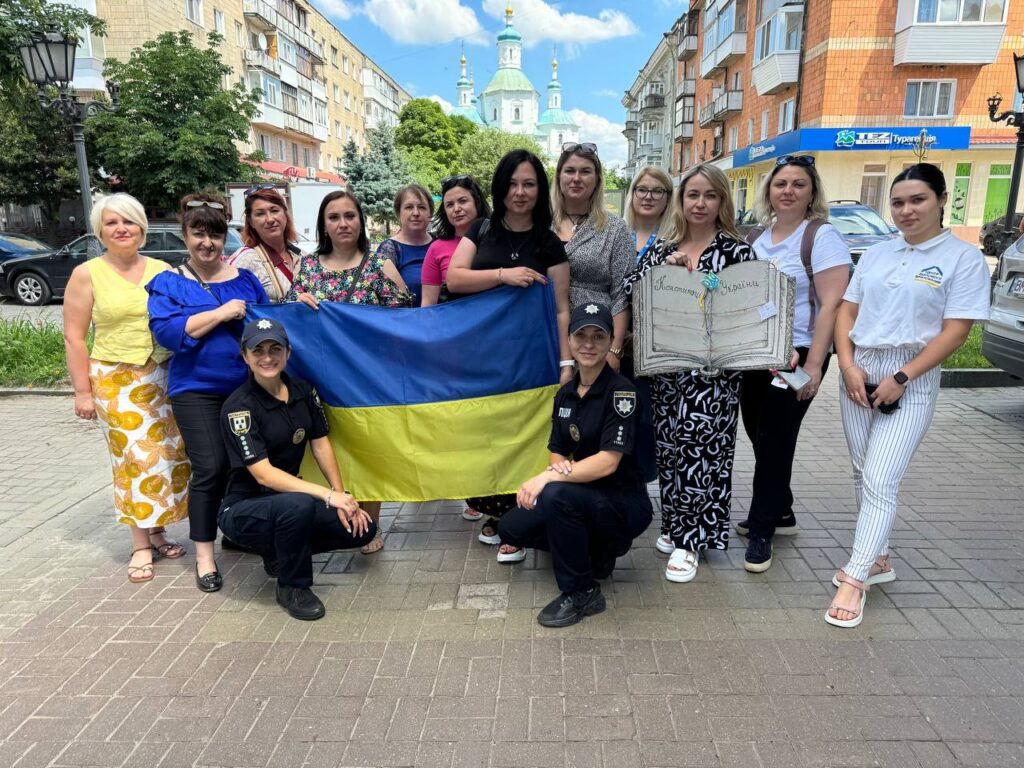
This material was created by the Legal Development Network with the support of the international charitable platform GlobalGiving. The content of this publication is the sole responsibility of the Legal Development Network.
P. S. In June 2024, the Legal Development Network (LDN) launched a crowdfunding campaign, Recovery of The South of Ukraine , as part of the crisis response program #StandWithUkraine.
You can Recovery of The South of Ukraine |
If you have notices an error on the web-site, please, highlight the text and press ctrl-enter.
Have you found your solution? Help others!
Print a poster
Print and place the Network's poster on a notice board in your entrance hall
Become a volunteer
Become a volunteer and assist others in finding problem solutions
Do you need a consultation ?
Online chat
Ask question and one of the LDN's lawyers
will answer it.
Chat's schedule: from 10 to 16
every day
Chatbot
Ask questions via LawLink Bot in any convenient way. LawLink Bot is a smart and digital legal assistant created by the Legal Development Network.

Our initiatives
The Legal Development Network implements comprehensive projects aimed at strengthening human rights, developing capable communities, and building sustainable tools for access to legal aid. We work at the intersection of advocacy, legal education, and local coordination of humanitarian response.
